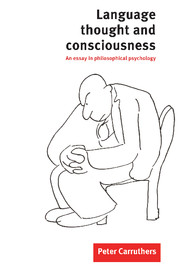Book contents
- Frontmatter
- Contents
- Preface
- Introduction
- 1 The geography of the issues
- 2 Which language do we think with?
- 3 Thought-based semantics
- 4 Holism and language
- 5 First steps towards a theory of consciousness
- 6 Second (-order) steps towards a theory of consciousness
- 7 A reflexive thinking theory of consciousness
- 8 The involvement of language in conscious thinking
- Conclusion
- References
- Index
1 - The geography of the issues
Published online by Cambridge University Press: 01 June 2011
- Frontmatter
- Contents
- Preface
- Introduction
- 1 The geography of the issues
- 2 Which language do we think with?
- 3 Thought-based semantics
- 4 Holism and language
- 5 First steps towards a theory of consciousness
- 6 Second (-order) steps towards a theory of consciousness
- 7 A reflexive thinking theory of consciousness
- 8 The involvement of language in conscious thinking
- Conclusion
- References
- Index
Summary
In this first chapter I shall outline the nature of my project, discuss its potential significance for both philosophy and psychology, and set out my background assumptions. Some of these assumptions I shall briefly defend, others I shall merely explain.
Conceptual versus natural modality
As philosophers so often do, I shall begin by making some distinctions. These are necessary to distinguish the project of this book from others which might travel under the same name. For if it is claimed that there can, or cannot, be thought without language, then much may depend upon the way in which the terms ‘can’ and ‘cannot’ are interpreted here. In fact, three distinct versions of independence and involvement thesis can be distinguished, corresponding to the distinctions philosophers have drawn between three different kinds of modality.
In the first place, a statement can be conceptually necessary, which means that it is true in virtue only of relations amongst the concepts involved in it. An example might be, ‘Anything red is coloured.’ A statement is conceptually necessary if its content cannot be conceived to be false without altering that content – it is a truth about all possible worlds in virtue only of what we mean by the terms involved. Taken in this conceptual sense, then, the claim that thought necessarily involves language can be true only if the concept of language is implicated in the concept of thought.
- Type
- Chapter
- Information
- Language, Thought and ConsciousnessAn Essay in Philosophical Psychology, pp. 9 - 39Publisher: Cambridge University PressPrint publication year: 1996



